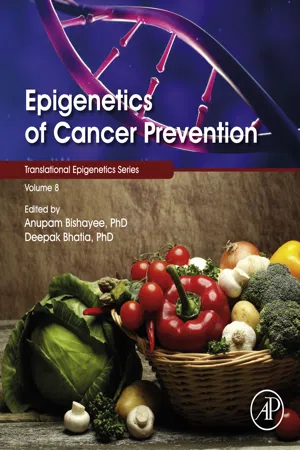
- 442 pages
- English
- ePUB (mobile friendly)
- Available on iOS & Android
Epigenetics of Cancer Prevention
About this book
Epigenetics of Cancer Prevention, Volume Ten is the first to look at epigenetics and chemoprevention together. Although there is numerous scientific data available on how epigenetics can lead to cancer and how chemoprevention can be beneficial in the treatment of, or improvement of quality of life, together they will set an advanced understanding for the reader in this upcoming field of chemoprevention influencing epigenetics. This book discusses molecular epigenetic targets of natural products, such as green tea polyphenols, curcumin and resveratrol, and organ specific epigenetic targets related to diverse types of cancer, for example prostate, colorectal, breast, lung and skin cancers.Additionally, it encompasses a discussion on research methods and limitations to study epigenetics and epigenomics of chemopreventive drugs and personalized cancer treatment with phytochemicals. The book is ideal for cancer researchers, health care professionals and all individuals who are interested in cancer prevention research and its clinical applications, especially in natural remedies.- Lists natural agents, including nutraceuticals, and their effects on normal or tumor genome- Addresses various epigenetic systems and mechanisms in the regulation and support of the mammalian genome- Discusses how various parts of dietary phytochemicals can influence or modify epigenetic mechanisms in several types of cancer
Frequently asked questions
- Essential is ideal for learners and professionals who enjoy exploring a wide range of subjects. Access the Essential Library with 800,000+ trusted titles and best-sellers across business, personal growth, and the humanities. Includes unlimited reading time and Standard Read Aloud voice.
- Complete: Perfect for advanced learners and researchers needing full, unrestricted access. Unlock 1.4M+ books across hundreds of subjects, including academic and specialized titles. The Complete Plan also includes advanced features like Premium Read Aloud and Research Assistant.
Please note we cannot support devices running on iOS 13 and Android 7 or earlier. Learn more about using the app.
Information
Genetic and Epigenetic Targets of Natural Dietary Compounds as Anticancer Agents
Abstract
Keywords
Introduction
Genetic Mutations in Cancer Targeted by Natural Dietary Products
Epidermal Growth Factor Receptor
Table of contents
- Cover image
- Title page
- Table of Contents
- Translational Epigenetics Series
- Copyright
- Contributors
- Foreword
- Part I. Molecular Epigenetic Targets of Natural Products
- Part II. Organ Specific Epigenetic Targets of Natural Products
- Part III. Miscellaneous
- Index